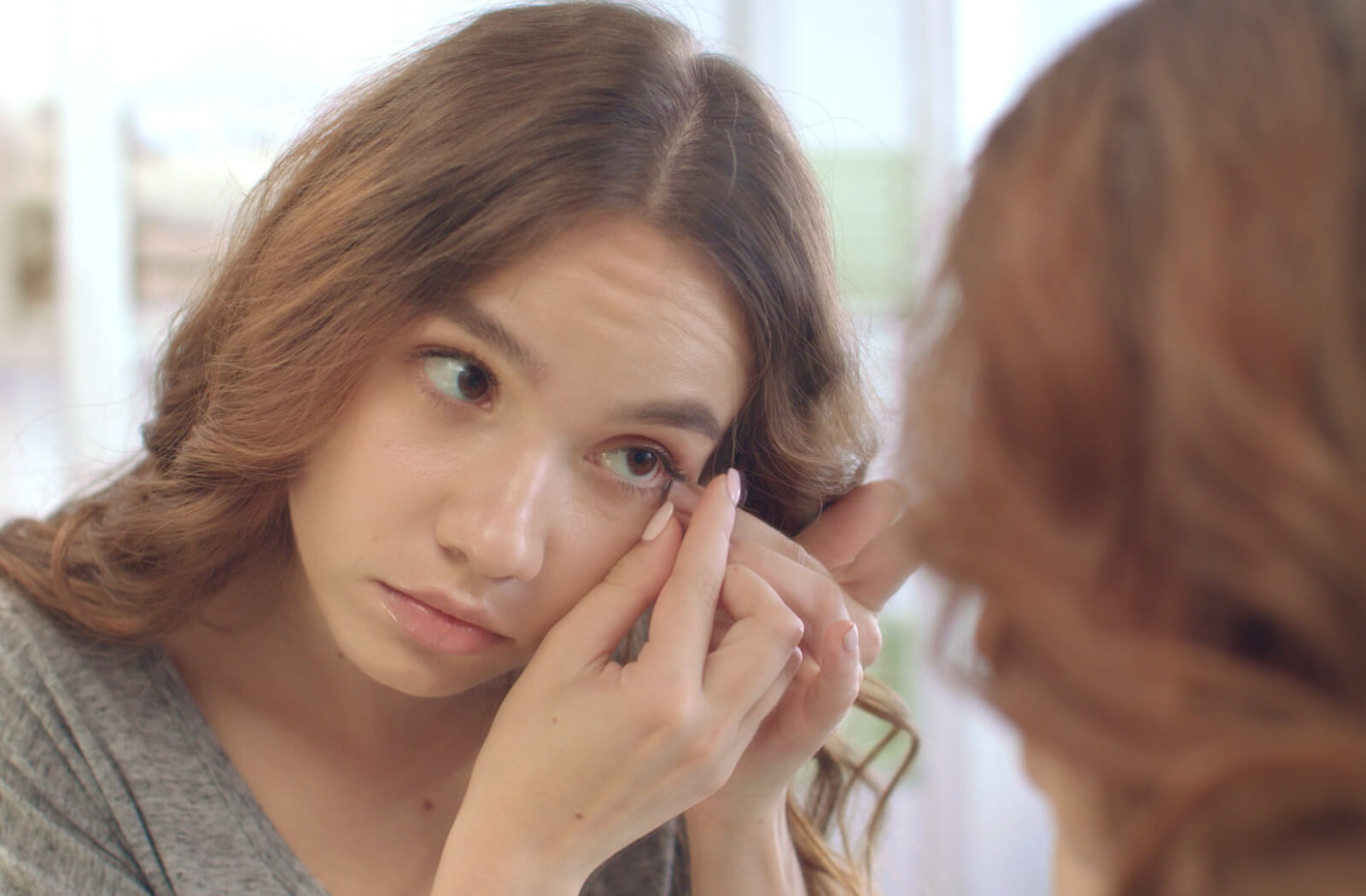Contact lenses have certainly revolutionized how many people see the world, providing clear vision without the need for glasses. But as with any medical device, proper care and usage are essential to avoid complications.
If you wear contact lenses, you’re probably well aware of the importance of properly caring for them. However, life often gets in the way, and it’s easy to forget to follow through on good habits—especially when it comes to taking out your contacts at night.
Whether you fall asleep accidentally or think one night can’t hurt, sleeping with your contacts in is a bad idea. Overnight wear of contact lenses can cause infection, irritation, corneal damage, or stuck contact lenses. To prevent uncomfortable symptoms, you should diligently follow your optometrist’s wear and care instructions for contact lenses.
What Happens if You Sleep with Contacts In?
While some contact lenses are designed for extended wear, meaning they can be worn continuously for up to 7 days, sleeping with contact lenses is generally not recommended. Wearing standard contact lenses while taking a power nap or sleeping overnight can raise your risk of developing certain eye conditions and uncomfortable symptoms.
Infection
One of the main risks of sleeping in contact lenses is the increased chance of developing an eye infection. Contact lenses can trap bacteria and debris between the lens and your eyes, which can multiply when left inserted for long periods. The longer the contact lenses remain in your eyes, the higher the risk of infections, such as corneal ulcers, which are painful and potentially vision-threatening.
Keratitis is a common contact lens-related eye infection. Improper contact lens wear can raise your risk of developing viral, bacterial, or fungal infections. Keratitis refers to inflammation of the cornea and can cause other uncomfortable symptoms, including:
- Red eyes
- Irritation around or in the eyes
- Watery eyes
- Pain around or in the eyes
- Light sensitivity
- Blurry vision
Dry Eye
Contact lenses can interfere with the natural oxygen transfer to your cornea, causing deprivation. The entire surface of the cornea is covered with the contact lens, and while oxygen can pass through lens materials, they can still create somewhat of a barrier to oxygen flow. Wear during the day may not lead to dryness with the right lenses, however, when you keep your contacts in for too long, you may experience dry eyes.
Contact lenses must be removed regularly to maintain good oxygen flow in your eyes and prevent them from getting dry and uncomfortable. Sleeping in your contacts increases the likelihood of developing dry eyes symptoms, including:
- Scratchy or gritty sensation
- Stinging or burning in the eye
- Redness
- Watery eyes
- Sensitivity to light
- Blurry vision
Damage to the Cornea
Sleeping in contacts can cause tiny scratches on your eyes’ outermost layer, the cornea. These abrasions can lead to a corneal ulcer, an open sore that can cause symptoms such as:
- Inflammation
- Soreness
- Excessive tearing
- White spots on the cornea
- Swollen eyelids
- Sensitivity to light
- Feeling like a foreign body is in your eye
- Discharge from the eye
Over time, these scratches can lead to scarring and other eye problems, which may require intensive treatments.
Stuck Contact Lenses
In some cases, sleeping in contact lenses can cause them to get stuck to your eye’s surface. Trying to remove stuck contact lenses can be incredibly uncomfortable and may cause further damage to your eyes if not done carefully.
The Importance of Proper Contact Lens Care
In addition to discouraging you from wearing contact lenses to bed, you should also attentively care for your contact lenses as instructed by your optometrist. Some best practices to help reduce the risk of complications when wearing contact lenses include:
- Always wash your hands thoroughly before handling lenses
- Clean and disinfect your contacts using an appropriate solution
- Replace your lens case every 3–6 months
- Use fresh contact solution with every wear
- Keep your lenses away from water
- Remove lenses before sleeping to allow your eyes to breathe
During your contact lens fitting and exam, your eye care team can provide instructions and advice to help you keep your eyes healthy as you wear your contacts.
Find the Right Contact Lenses for Your Waking Hours
Sleeping in contacts is not only uncomfortable and inconvenient but can also cause serious issues affecting your eye health. If you find yourself sleeping in your contacts regularly, having a conversation with your eye care provider is essential.Your provider can help you choose appropriate contact lenses and remind you of the importance of practicing good contact lens hygiene. Visit Urban Optique for a comprehensive contact lens exam and fitting to find the right contact lenses for your lifestyle. Your vision is worth the extra effort to take care of your eyes properly.
















